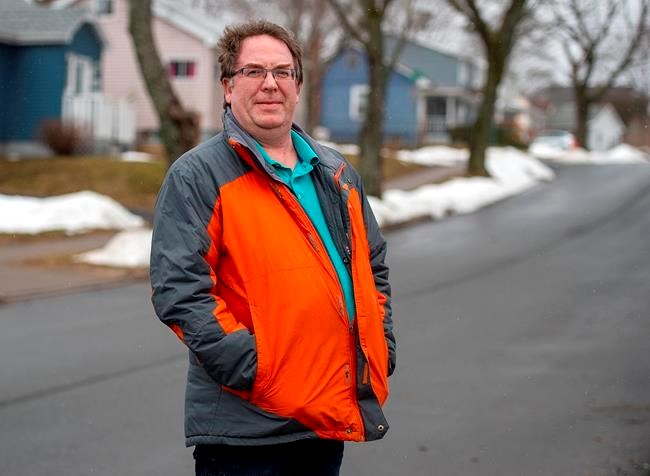HALIFAX — On evenings when Sean Hoskin collapses into bed, heart pounding and mind foggy from his yearlong battle with COVID-19, he wonders when a clinic to treat his symptoms might emerge in Atlantic Canada.
"My fear is that I'm going to be like this forever," the 50-year-old Halifax resident said in a recent interview.
The issue of a lack of timely treatment for the so-called "long haulers" — people who suffer symptoms such as shortness of breath and physical exhaustion months after their first bout of the illness — has been raised across the country by support groups.
Specialized clinics have opened in Western and Central Canada, in some instances offering access to occupational therapists, nutritionists, psychologists, nurses and referrals to specialists. In the United Kingdom, the National Health Service announced the formation of a network of 60 such clinics in December.
However, on Canada's East Coast, patients say they are still searching for a similar, one-stop site to treat symptoms that range from difficulty drawing a breath to tingling pain in their limbs.
"In Atlantic Canada, we're at the mercy of how well we've done containing the virus, leading to our low numbers of infected patients," Hoskin said. "It's had an impact on what we can expect to see from the provincial government in terms of specialized clinics."
International studies currently predict about 10 per cent of COVID-19 patients develop longer term symptoms. In Atlantic Canada, where about 4,100 cases have been officially documented, this suggests long haulers may eventually number in the hundreds, rather than the thousands expected in larger provinces.
But Hoskin argues the lower infection rates shouldn't mean he and others are left to rely solely on family doctors, who may be unaware of how to treat their symptoms, while they spend months awaiting appointments with cardiologists, neurologists and other specialists.
In New Brunswick, which is fighting a second wave of infections that emerged earlier in the year, Emily Bodechon says she has largely assembled her own treatment effort.
"While it's great that our COVID-19 case count is low, it's not been great as a patient to find out nobody knows how to treat you," she said in an interview last week.
Almost a year since her infection, the 45-year-old health worker still has respiratory issues, searing headaches and "brain fog" that makes it hard to process new information.
Bodechon sought online information from a post-COVID-19 clinic in New York and took part in video calls for patient information. "I went through a six-week program on my own, and it was the most helpful thing I had," she said.
She said she hopes provincial governments in the region collaborate to set up centralized clinics that employ telemedicine, so that she can actually speak to doctors with expertise.
In Halifax, a senior physician with Nova Scotia Health says doctors with the province's health authority are turning their attention to potential pilot projects.
Dr. Christy Bussey, the medical lead for COVID-19 in-patient care in the authority's central zone, said in an interview on Thursday that in the longer term, family doctors will need training on how to care for the lingering impacts of the illness.
But in the short term, she's advocating for a post-COVID-19 clinic, potentially attached to an existing clinic in Fall River, N.S., which already treats people with conditions such as chronic fatigue syndrome.
She said she has noticed "a gap in the system for following patients who developed new or ongoing symptoms."
The physician added it's too early to know how much additional provincial or national funding is needed for an Atlantic post-COVID-19 clinic, as a formal proposal has yet to be completed, but she argues the need for added resources is evident.
"Some of these patients are nearly completely disabled by the symptoms they're having," she said.
Dr. Alexis Goth, a lead physician at the Fall River clinic, said the first long haulers are starting to trickle into her clinic. She is hopeful resources can be added to pay for a larger numbers of patients by early summer.
She said one model for COVID patients may be an adapted version of an eight-week, Zoom-based treatment the clinic uses for fibromyalgia, an illness that can cause muscle pain, fatigue and sleep issues. She said the online treatment could be combined with one-on-one therapy, making use of the occupational therapist, nurses and other experts at the clinic.
Susie Goulding, the leader of a national long-haulers support group, cautions that as new clinics and research projects emerge, they should be open to the many patients who didn't receive a formal diagnosis of COVID-19, often due to a lack of testing in the early months.
“Most people don’t have a positive test,” she said in a recent interview. “They should still be included."
Meanwhile, Hoskin said he's continuing to search for placement in a research study that includes treatment, finding he still feels like collapsing after a brief trip to buy groceries.
"At 50 years old, my heart rate is often at 110 (beats per minute) when I stand up, and I still can't smell and taste other than very basic odours," he said. "We really need to find out what is causing this."
This report by The Canadian Press was first published Feb. 28, 2021.
Michael Tutton, The Canadian Press



